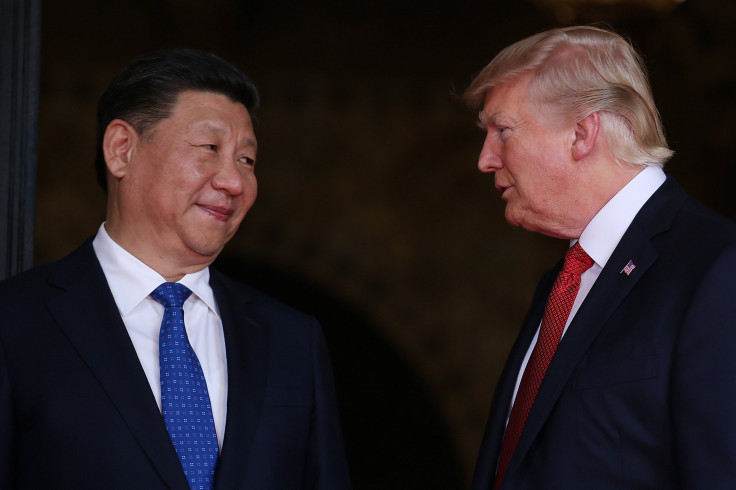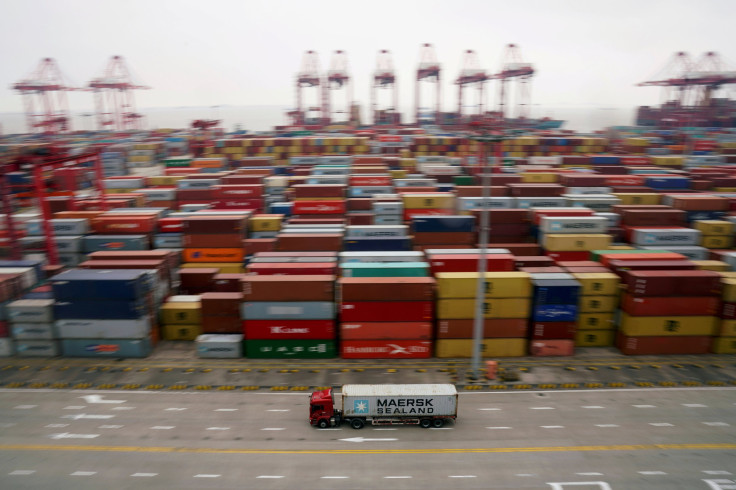Trump Could Have Upper Hand In China Trade War, Economists Predict

(Correction: The names of Hugh Johnson and his investment management firm were spelt wrongly in the last paragraph of an earlier version of this story. The error is regretted.)
President Donald Trump could scarcely have picked a better moment to press China over its trade policies. For all the hand-wringing in the markets and media, economists told Newsweek/IBT survey that they expect the tariffs on $34 billion of Chinese imports, scheduled to go into effect on Friday, to have virtually no impact on strong U.S. economic growth in 2018.
The Chinese economy, by contrast, is in worse shape. Several economists said Beijing had more to lose if the retaliatory tariffs it has threatened expand into an all-out trade war.
Analysts suspect Trump's combative posturing is a strategy to force China to the negotiating table. The "Trump administration’s objective is a trade deal with China, and President Trump sees his lack of dependence on corporate backing, and hence ability and willingness to accept tariffs if negotiations don’t work, as a rare opportunity for the U.S. to “play hardball” and get a deal with China that has alluded prior administrations," Mike Englund, chief economist at Action Economics, explained.
THE U.S. BULL VERSUS CHINA'S BEAR
China's economy, the world's second-largest, is cooling down with growth slowing to around 6.6 percent from the double-digit highs of the first decade of the century and its stock market is in bear territory, having tumbled 20 percent so far this year. A research note from DBS cites liquidity shortage, bond default, and the escalating trade friction with Washington as some of the reasons for this slide.
By contrast, the U.S. economy is expected to experience robust growth of around 3.0% in 2018 and the Dow Jones, the U.S.'s benchmark stock index, has been on a roll in the last 12 months. President Trump has presided over a strong stock market performance since he took office and it is still almost 25 percent up from the close of 19,827.25 on Inauguration Day, Jan. 20, 2017.
Latest U.S. data shows signs that the economy is gaining momentum, with retail sales and industrial production hitting their strongest levels, unemployment rate dipping to new lows, manufacturing surveys showing expansion and consumer confidence figures at historic highs.
Citing the stronger U.S economy, two analysts expect China to feel much greater economic pain if the trade war intensifies.
"Some adverse impact on growth looks likely, more so in China, but to a lesser extent in the US," David Sloan, senior economist at Continuum Economics, said.

U.S IS FIGHTING FIT
While warning of the risks of a retaliatory trade dispute, some economists expect U.S. economic growth and a strong dollar to soak up the impact of the unprecedented tariffs measures in the short term.
"Since actual tariff actions have been small thus far relative to total trade, we have not altered our U.S. or China GDP estimates, and we think the impact on bilateral trade will be small if the conflict doesn’t escalate in actuality, even if it escalates in rhetoric," Englund said. "Our current estimates only incorporate actual tariffs implemented. Similarly, we assume a normal flow of Treasury investments."
A healthy U.S. economy offsets the growing corporate anxiety at the prospect of a prolonged trade dispute, Deutsche Bank economists wrote in a note obtained by the Newsweek/IBT survey. They predict minimal impact on equity earnings and continue to envisage a further upside this year.
Similarly, Liz Sonders, chief investment strategist at Charles Schwab, wrote in a note: "There appears to be at least a temporary balance between positive developments and the proverbial "wall of worry."
Though volatility in the foreign exchange markets is likely to continue, analysts expect the dollar to remain strong while Asian forex could be pummeled. As China's Renminbi plunges, emerging markets Asia currencies are expected to move lower, particularly Trump-trade sensitive currencies such as the South Korean Won and Taiwan dollar.
Indeed, China’s veiled threat to divest its holdings of U.S. Treasury bonds, valued at about $1.2 trillion, appears to be largely toothless, at least in the short term. Reports that China could sell off the bonds emerged after a media interview by China's ambassador to the U.S., Cui Tiankai, in early April.
Nathan Hung Lai Chow, Econ/Macro Strategist at The Development Bank of Singapore (DBS), believes China may slow down the purchase of Treasuries but will not resort to outright selling. "Treasuries sales are not hard to counter, as the Fed is always ready to buy or sell U.S. debt. Next question is what does China do after selling treasuries? Not much; Eurozone bonds are yielding close to zero."
GOING THE DISTANCE?
But analysts are not discounting the possibility that a Trump-inspired trade war will eventually hit the U.S economy hard.
“We view substantial escalation of trade disputes leading to unilateral imposition of further tariff and non-tariff barriers as a real possibility,” said Jean-Franscois Perrault, senior vice-president and chief economist at Scotia Bank. “Trade-related uncertainties will act as a small drag on US growth in 2019.”
Other analysts see a worse impact. Sloan of Continuum Economics warns that tit-for-tat tariffs could result in a painful derailing of U.S. economic growth. But the hope is that the protagonists in the bitter trade dispute will eventually come to the table and negotiate, relieving these worries and minimizing the impact on the economy.
“We are concerned about the potential for trade frictions to become a significant drag on growth, but we are still assuming that negotiations will produce an easing of tensions before negative effects become large,” Jim O’Sullivan, chief economist at High-Frequency Economics, wrote.
STILL, THE DEFICIT MAY NOT COME DOWN MUCH
The size of the tariffs makes very little difference to a country’s global trade deficit, said Gary Hufbauer, a senior fellow at Peterson Institute for International Economics.
Trump has volubly argued that the tariffs are a vital weapon to force China to abandon unfair practices that have created a trade imbalance that has cost American jobs.
Hufbauer, however, said even if Trump succeeds in getting everything he has promised to deliver, that would not make much of a difference to the size of the U.S trade deficit. He expects the deficit to remain about $300-$350 billion in 2018. The US trade deficit with China was $375 billion in 2017.
“I would not expect the trade deficit to be reduced more than $50 billion in a trade war. I can see [a] two-way trade going down but I don’t see a big reduction in deficit,” he said.
Hugh Johnson, chief investment officer at Hugh Johnson Advisors, sees the US trade deficit at $320 billion for 2018.“Based in part on the poor relative performance (versus US) of Chinese equities and the uninspiring performance of leading economic indicators for China I would reduce our forecast for the Chinese trade balance with the US.”
© Copyright IBTimes 2024. All rights reserved.





















